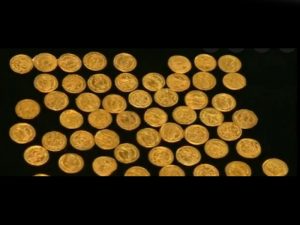Some people spend a lifetime trying to amass a fortune through hard work and guile. For one British man, it took only 20 minutes in a field with a metal detector — the first 20 minutes he had ever used such a machine.
According to the St. Albans & Harpenden Review, Wesley Carrington took his newly bought metal detector out into a field near St. Albans in Hertfordshire, England, last October. After finding a spoon and then a half penny, Carrington’s machine beeped a third time, and he dug seven inches down to uncover a coin that was gold in color with a Roman figure on it.
As it turns out, the gold coloring was actually gold, the coin was an ancient Roman solidus, and there were 158 more buried with it, a hoard with an estimated worth of 100,000 pounds sterling, or $156,000, according to The Daily Mail.
Carrington found 55 of the coins that first night, stopping only because it got too dark outside to continue. A group of experts later returned to discover 104 more coins at the site. All in all, the hoard is believed to be one of the largest collections of Roman gold coins ever found in England, according to the BBC. St. Albans District Councillor Mike Wakely hailed it as “an exciting find of national significance,” the outlet reports.
The statistical likelihood of finding a hoard of such import with so little effort is difficult to calculate, much less grasp.
“I?ve been in the job for ten years and it is certainly the most spectacular find,” Julian Watters, the finds liaison officer for Hertfordshire and Bedfordshire, told The Daily Mail. “Just to put it in context, I had only previously seen four Roman gold coins out of 50,000 finds,” explained Watters, who helped excavate the remaining coins.
Carrington told the St. Albans & Harpenden Review that he did nothing to prepare for his treasure hunt besides watching a few YouTube videos about using a metal detector, and that he chose his location by driving to “the closest area of woodland to where I live.”
Even his metal detector was a beginner’s tool. According to The Daily Mail, Carrington chose his Garrett Ace 150 detector because it was the most basic model at the shop closest to him, in Berkhampstead. A online vendor of metal detectors described the Garrett Ace 150 as “the ideal metal detector for parent-child expeditions or for adults interested in exploring a potential hobby.”
The find was so unlikely that Carrington himself did not initially realize what he had. Days after his discovery, he took a coin back to the Berkhampstead shop and asked what he should do with it, the Daily Express reports. Owner David Sewell recalled being “gobsmacked” by the discovery. “He came to see us and we looked at it and thought: ‘Is this a stunt?'” he said.
Sewell referred Carrington to the local history museum, which organized the larger excavation of the area.
One element of Carrington’s first-time success shouldn’t be a complete surprise: the location. According to the Associated Press, St. Albans lies in an area rich with Roman historical artifacts. The town “boasts a Roman theater and ruins of ancient walls,” and is home to a museum devoted to documenting “everyday life in Roman Britain,” AP notes.
According to The Daily Mail, the coins will now be sent to the British Museum for an official appraisal, after which they will go to auction. Carrington must split the proceeds with the owner of the land where the coins were unearthed.
In the meantime, he has joined a metal detecting club and will continue his treasure hunting in the fields of Hertfordshire. Unfortunately, Carrington says that he hasn’t found anything since October. They don’t call it beginner’s luck for nothing.
Original article on







